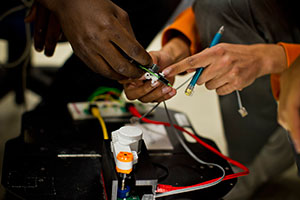
As we rely more on electrical and electronic devices to do our work and live our lives, the demand for electrical engineers1 continues to increase. If you're considering a degree in this exciting and potentially growing field, you'll want to know what types of career paths an electrical engineering degree can prepare you for.
A degree in electrical engineering can help qualify you to design, develop and test electrical and electronic devices, which are used in many different industries. Manufacturers of electrical equipment and components; companies that generate and distribute power; medical device and navigation equipment manufacturers; and research and development companies all employ electrical engineers.
The Role of the Electrical Engineer
Electrical engineers can work in many different roles, in various stages of the product's development, installation and use. Some of these roles include:
Research - If you are a creative and inquisitive person, you might pursue a career as a research engineer. You would design new products and improve existing electrical products. Research engineers usually work in laboratories of manufacturing companies or government agencies.
Design - As a design engineer, you would take the ideas of the research engineer and make them come to life. A design engineer is creative and flexible, yet practical. They use computer-generated models to determine if a given design is workable.
Project - Once the design is completed, a project engineer creates a prototype that can be tested. Project engineers often supervise other engineers, so leadership skills are important for this role.
Testing – Once the prototype is completed it needs to be tested, and often modified based on the results of those tests. The test engineer performs these duties, and must be creative, yet systematic, in their thinking.
Systems – A system engineer installs and maintains the electrical components and equipment. They may work for the manufacturer, but often perform their jobs at customer sites.
Applications – The engineers who make the electrical products work the way they are supposed to are called application engineers. These people typically work for the company that is using the products and components designed by other engineers.
Degree Curriculum
The curriculum for a Bachelor of Science in Electrical Engineering can include computer courses such as programming and computer architecture; digital and electronic design; circuit analysis; product design; electromagnetics; communication systems; and electronic design. Students will also take math and science courses like probability and statistics, engineering mathematics and physics.
Qualities of an Electrical Engineer
In addition to knowing what career paths an electrical engineering degree will take you down, there are certain personality traits that may help you to be successful in this field. Electrical engineering requires a strong background in math and science, along with a practical, patient approach. Other important qualities an electrical engineer should have include concentration for complex tasks; initiative and ability to 'think outside the box,' and advanced math skills. In order to work with other engineers and customers, electrical engineers should have good interpersonal and communication skills. They may often be called upon to explain technical ideas to non-technical people.
Many engineers are called upon to supervise other engineers and technicians. For these roles in electrical engineering, you will need supervisory skills. This includes the ability to instruct others, to provide feedback and to oversee the work of those who report to you.
Career Outlook for Electrical Engineers
According to the U.S. Department of Labor Statistics, the median pay for electrical and electronics engineers were $89,180 per year in 2013.2
The industries most likely to employ electrical engineers were electric power generation, transmission and distribution; communications equipment manufacturing; electrical equipment manufacturing; and semiconductor and other electronic component manufacturing. The top paying industries included software publishers; oil and gas extraction; and computer systems design and related services.
As you can see, a degree in electrical engineering can lead you to an interesting career. Learn more about getting an electrical engineering degree from CTU.
1. http://www.bls.gov/ooh/architecture-and-engineering/electrical-and-electronics-engineers.htm
2. http://www.bls.gov/oes/current/oes172071.htm
All statistics are national historical averages and many vary geographically. Find employment rates, financial obligations, and other disclosures at www.coloradotech.edu/disclosures.

